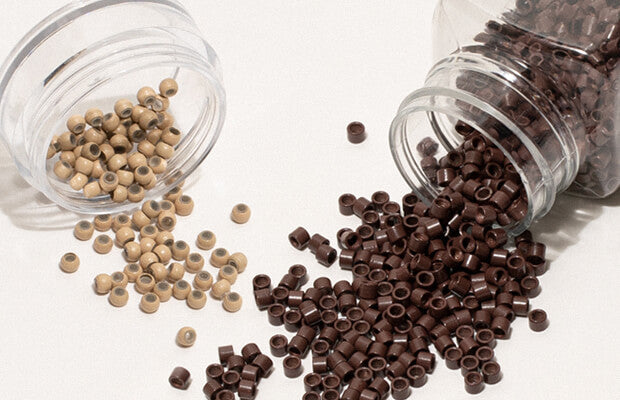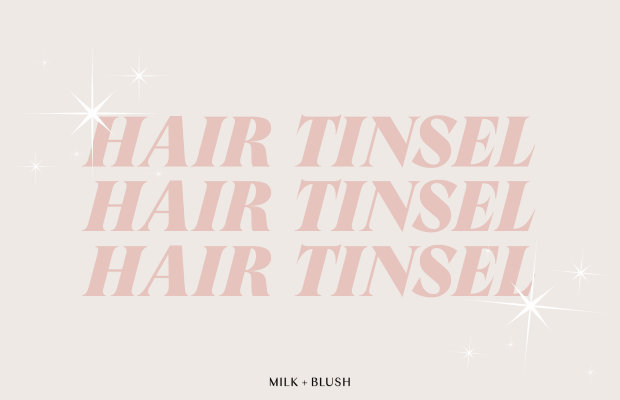Are Your Hair Extensions Causing Itchy Scalp?
Last updated on

With the right hair extensions, you can completely transform your look — getting your hair looking glam and gorgeous in minutes. But if they’re left in too long — or improperly clipped in — you can find yourself experiencing scalp irritation and even an itchy, flaky scalp.
Our scalps are delicate and sensitive and need as much care and attention as our hair. Like our skin, the scalp needs moisturising with oils and regular shampooing for cleanliness, circulation and a healthy PH balance, to keep your head and hair looking their best.
So, if you’re looking for everything you need to know on hair extensions and scalp health —including how to reduce inflammation, irritation and itchiness — you’ve come to the right place.
Why are my hair extensions causing an itchy scalp?
There are many reasons your extensions may be causing scalp irritation — it’s not uncommon for people to experience an itchy scalp or mild irritation from hair accessories.
Some of the main reasons for experiencing an itchy scalp while wearing your extensions include:
Adjustment period to the extensions — It can take a while for new extensions to settle in when they’re fitted for the first time. New extensions can cause subtle rubbing on the sides of your head, causing areas around the fittings to become slightly inflamed or irritated. Your hair professional
should make you aware of this and, in most cases, itchiness or inflammation should ease in a few days.
An allergic reaction — If itchiness and inflammation don’t subside over a few days — or the itchiness intensifies or becomes unbearable — it may be a sign of an allergic reaction to the extensions. Artificial extensions can cause subtle skin irritation — so, if the problem persists or becomes more severe, take them out or have them removed and consult with your doctor or dermatologist.
A sensitive scalp — Sometimes, it really doesn’t take much to irritate the scalp. If you’re prone to sensitive skin or a flaking or itchy scalp, professional extensions or even clip-ins can aggravate sensitive skin, but this is normal during the settling period.
Unkept extensions — It’s natural for buildups of natural oils, sebum and products – like hairspray and conditioning products — to accumulate in your hair between washes. But this can also build up in your extensions if you’re not careful. If left untreated, it can cause irritation, inflammation and itchiness, so it’s important to make sure to regularly brush and properly clean your extensions.
What are the causes of an itchy scalp?
Sometimes, your extensions might not be the root cause of the problem – they may simply be worsening the sensation of a dry or sensitive scalp caused by other factors.
Many of us will experience this at some point in our lives — and with simple lifestyle, hair and skincare changes, it’s possible to get your head and hair feeling and looking its best.
Some of the common causes of dry, itchy or irritated scalps include:
Seborrheic Dermatitis —Typically caused by dandruff, this is one of the most common causes of an itchy scalp. It occurs when the scalp becomes especially oily or dry, leading to the formation of flakes that cause itchiness and even redness and irritation in more severe cases.
Dry Scalp — Dryness can be caused by cold weather, overuse of shampoo and conditioning products, harsh leave-in products, dehydration and more – stripping natural oils from the hair and scalp.
Allergies — Unfortunately, it isn’t uncommon to have a sensitive scalp caused by allergies. Harsh products and chemicals can contain certain allergens that are known to aggravate sensitive skin.
Excessive Sweating — Usually, sweating isn’t a problem for sensitive skin. However, excessive sweating means additional oils on the skin’s surface, making it a potential breeding ground for bacteria that cause irritation.
Stress — Psychological stress raises the levels of androgens in the body, causing our follicles to produce more sebum, our scalp to become oilier and our heads to be more prone to dandruff and itching.
Certain Medications — Some medications may have the unfortunate effect of contributing to an itchy scalp and exacerbating existing skin conditions that may be causing inflammation and itchiness.
Skin Conditions — Conditions like contact dermatitis from harsh chemicals and bacteria folliculitis can cause itchiness.
How do you treat an itchy scalp?
Itchy and flaky scalps are frustrating — especially when you’ve tried everything to get your hair looking its best and avoid dandruff buildup.
Luckily, there are lots of effective at-home treatments to relieve itching, stop dandruff in its tracks and keep your hair looking and feeling great without medication.
Some of the most effective ways to treat an itchy scalp are:
Use a Gentle Shampoo — Opting for an extension-friendly, fragrance-free or hypoallergenic shampoo reduces exposure to harsh chemicals that can cause or worsen irritation.
Maintain Good Scalp Hygiene — Washing your hair regularly – with extension-friendly products – keeps the buildups of debris, dirt and sebum from wreaking havoc on your scalp. Sebum and natural oils are important for hair and scalp health, though, so it’s important not to over-wash your hair.
Avoid hot water — Hot water may feel nice to bathe and shower in, but if it’s too hot, it can damage the sensitive skin on the scalp and worsen dryness and itching. It’s best to use warm or even tepid water when cleansing your scalp.
Moisturise – Itchiness, dryness, and irritation are also caused when the scalp is very dry. Like all skin, when it’s dry, it needs moisture. Use a gentle, hydrating leave-in conditioner to lock in moisture.
Anti-Dandruff Shampoos – Dandruff can be a vicious cycle — it causes itchiness, while scratching creates more dandruff. If you’re struggling, try anti-dandruff shampoos. These contain active ingredients like zinc pyrithione, selenium sulphide, ketoconazole, and salicylic acid, which are proven to help prevent dandruff and inflammation that cause itchiness.
How to prevent hair extensions from causing itchiness
Nurturing your scalp with the right products, eating a balanced diet, and keeping your hair clean and tangle-free will all help ease itchiness. But it’s also possible your hair extensions can cause itchiness and irritation, too.
Some steps you can take to stop your extensions causing itchiness are:
Stick to an aftercare routine – After fitting, extensions can become itchy during the adjustment period — making aftercare crucial to soothe irritation. Using specialist hair extension serums and moisturisers can help limit some of the rubbing and friction experienced while they’re settling in.
Scalp massages — A simple scalp massage with a chamomile tea infusion can help alleviate the itchy symptoms and provide relief before a thorough wash.
Ensure they’re fitted correctly — Extensions need time to settle in place. However, if they’re still itching or even causing you pain and inflammation, visit your salon to have them adjusted.
Check for allergies — Whether you’re attaching them yourself or having professional extensions fitted, it’s important to patch-test adhesive or metal clips to make sure you don’t have an allergic reaction. Allergies can cause inflammation and itchiness and that doesn’t subside with time, so make sure to get them checked if the symptoms haven’t gone away in a couple of days.
Check with a dermatologist — Sometimes, a professional opinion is best. If your scalp is prone to itchiness, inflammation or even grease buildup and dandruff, extensions need to be handled with extra care. A dermatologist will help you understand what’s causing an irritated scalp, help you treat it and advise on the best extensions to avoid further irritation.
How often should you wash your hair to prevent an itchy scalp?
While keeping your hair clean and hygienic is essential, it’s important not to over-wash it – or you risk weakening the bonds attaching your hair extensions.
Washing your hair around twice a week – with a salon-grade shampoo and conditioner made with high-quality ingredients – is recommended to avoid stripping the hair of its natural oils, which can cause uncomfortable dryness and itching.
Looking after your extensions not only keeps your hair looking and feeling its best but can also help avoid discomfort from dryness or irritation of your scalp.
Shop our range of hair extension accessories today to find your perfect product, including our loop brush and leave-in silicone conditioner.
Looking for more help maintaining your extensions and hair health? Check out our hair blog for the latest tips from our experts.
















